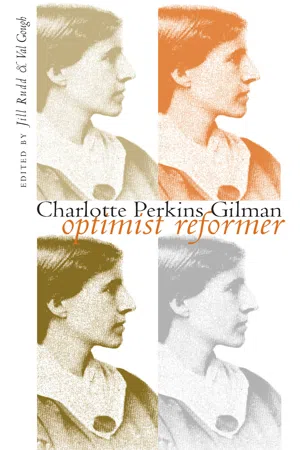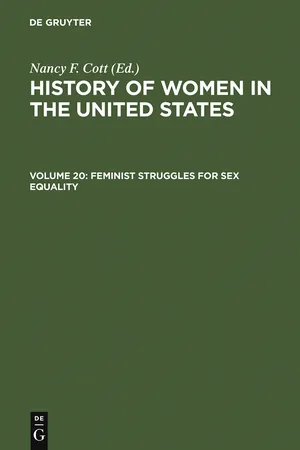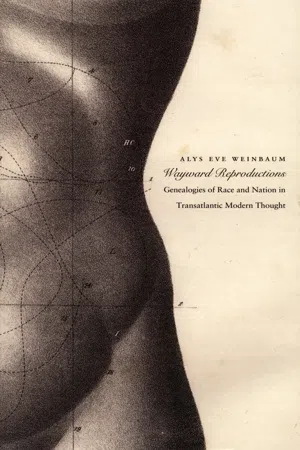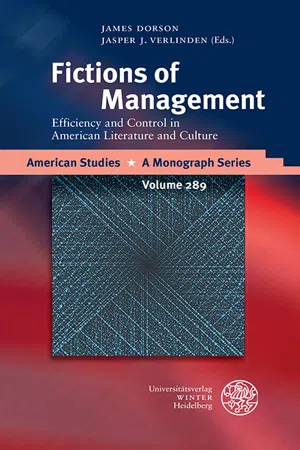Politics & International Relations
Charlotte Perkins Gilman
Charlotte Perkins Gilman was a prominent American feminist, sociologist, and writer in the late 19th and early 20th centuries. She is best known for her influential work "The Yellow Wallpaper," which critiques the patriarchal medical establishment's treatment of women. Gilman's writings and activism played a significant role in advancing women's rights and challenging traditional gender roles.
Written by Perlego with AI-assistance
Related key terms
1 of 5
4 Key excerpts on "Charlotte Perkins Gilman"
- eBook - PDF
Charlotte Perkins Gilman
Optimist Reformer
- Jill Rudd, Val Gough, Jill Rudd, Val Gough(Authors)
- 1999(Publication Date)
- University Of Iowa Press(Publisher)
a n n j. l a n e Charlotte Perkins Gilman and the Rights of Women Her Legacy for the 1990s When I finished the biography of the woman I came to think of as ‘‘my Charlotte’’ – a phrase that opens my text – I thought I was finished forever with her. But I had not anticipated two reactions: first, how hard it would be for me to give her up, and, second, how much extraordinary interest in her work would be generated in the years ahead, enough to merit a Charlotte Perkins Gilman So-ciety and a Charlotte Perkins Gilman Newsletter , which reports on many activities around the nation from a variety of fields, and how many papers would be given regularly on both sides of the Atlan-tic. In the last week two new contributions crossed my desk, a book by a professor of English on Gilman and the meaning of her utopian writings and an essay by a professor of economics on the centrality to the field of economics, although not recognized, of Women and Economics . What a pity Gilman could not be around to observe her success; she would so have loved the seriousness with which so many feminists read her words. How sad it is that her grandchildren, both of whom are alive, will probably not feel the pleasure and satisfaction in her stead, because they probably do not. Her daughter, Katharine, ended her life with unresolved am-bivalent feelings about a mother she felt abandoned her, for whose pain she understandably had little sympathy. ‘‘My mother went to pieces when I was born,’’ wrote Katharine in her maturity, ‘‘and it wasn’t even a difficult birth,’’ making clear her unwill-ingness to recognize her mother’s mental illness. Gilman’s grand-children, Dorothy and Walter Chamberlain, saw their grand-mother through their mother’s eyes – as a woman who abandoned her maternal responsibilities and as an ideologue whose ideas and reputation embarrassed them. - eBook - PDF
- Nancy F. Cott(Author)
- 2012(Publication Date)
- De Gruyter Saur(Publisher)
HISTORY OF WOMEN IN THE UNITED STATES Mary A. Hill Charlotte Perkins Gilman A FEMINIST'S STRUGGLE WITH W O M A N H O O D τ Ν A L E T T E R written from Belmont, New Hampshire, September 2, A 1897, Charlotte Perkins Stetson exclaimed, Thirty-five hundred words I wrote this morning, in three hours! A book's chapter in one sitting; a successive six-week dizzy pace of morning writing; elaborate consultations with her closest critic, Houghton Gilman, soon to be her second husband; and thus was Women and Economics dashed into print. Jane Addams, already emerging as one of America's foremost social reformers, expressed her gratitude to Charlotte, her pleasure and satisfaction, her greatest admiration for the Masterpiece. Florence Kelly, another pioneer of social settlement reform viewed it as the first real, substantial contribution made by a woman to the science of economics. According to The Nation, Since John Stuart Mill's essays on The Subjection of Women, there has been no book dealing with the whole position of women to approach it in originality of conception and brilliancy of exposition. 1 Charlotte Gilman quite naturally felt increasingly elated as positive reviews rolled in, despite the societal distortions her book both reflected and described. A flamboyant speaker, a writer with a penetrating wit, she was rapidly emerging as a major theorist and popularizer for the woman's movement in turn-of-the-century America. Publicly she at-tempted to analyze and expose the ubiquitous effects of sex-based in-equalities and the sources of female strength; and privately she acknowl-edged that many of her perceptions emerged as well from agonizing 1 Quotations from private letters are made with the permission of The Arthur and Elizabeth Schlesinger Library on the History of Women in America, Radcliffe College, Cambridge, Massachusetts. - eBook - PDF
Wayward Reproductions
Genealogies of Race and Nation in Transatlantic Modern Thought
- Alys Eve Weinbaum, Inderpal Grewal, Caren Kaplan, Robyn Wiegman, Inderpal Grewal, Caren Kaplan, Robyn Wiegman(Authors)
- 2004(Publication Date)
- Duke University Press Books(Publisher)
For so long as an unself-reflective portrait of Gilman remains dominant, Gilman’s disturb-ing ideals will continue to haunt feminist self-conception and pro-mulgate the mistaken belief that it is possible for a feminism that 64 Wayward Reproductions does not account for the racialization of gender and sexual forma-tions to be truly liberatory. Gilman’s Genealogy On first leafing through the biographies and bibliographies that record Gilman’s accomplishments, it is easy to comprehend the designation of this formidable woman as a ‘‘foremother.’’ In the prime of her life Gilman lectured widely; wrote fiction, poetry, so-cial analysis, and political polemic; single-handedly produced her own journal, The Forerunner (1909–16); published eight novels, 171 short stories, nine book-length nonfiction manuscripts; and was the author of over one thousand essays. 6 Gilman was a trans-atlantic phenomenon with wider geographic cachet. When H. G. Wells came to the United States Gilman was the one person with whom he requested a meeting; when she traveled to Eng-land she was welcomed into Fabian circles. Comparing Gilman to the famous British luminary, an American editor dubbed her ‘‘the George Bernard Shaw of America, unless we prefer to call Mr. Shaw the Charlotte Perkins Gilman of England.’’ Women and Economics , Gilman’s bestseller, was heralded as among the most groundbreaking philosophical arguments on women’s rights ever written. William Dean Howells insisted that with it Gilman antici-pated the radical economist and social critic Thorstein Veblen. The London Chronicle argued that Gilman’s masterpiece rivaled John Stuart Mill’s Subjection of Women . 7 And, not least, Gilman’s writ-ings were translated into German, Dutch, Italian, Russian, Hun-garian, and Japanese and used as textbooks in a number of college classrooms. - No longer available |Learn more
Fictions of Management
Efficiency and Control in American Literature and Culture
- James Dorson, Jasper J. Verlinden(Authors)
- 2019(Publication Date)
- Universitätsverlag Winter(Publisher)
B EN N ICHOLS Reproduction Lines: Feminism, Management, and Charlotte Perkins Gilman My focus in this chapter is on the underappreciated importance of forms of management to aspects of twentieth-century feminism, mainly the early twentieth-century feminist Charlotte Perkins Gilman, but also related parts of second-wave feminism and contemporary queer theory. In a range of politically engaged scholarship, from cultural studies to literary theory, which I address below, “management” is often imagined primarily as a pernicious process of social control, domination and mystification. But the works I focus on, I argue, offer alternative per-spectives, which treat it instead as the structured arrangement of human effort that can help to make better worlds. Gilman, of course, wrote in the Progressive Era context of increasingly prevalent theories of scientific management. She sought to expand the systematization and rationaliza-tion that these theories had championed to a wider range of social pro-cesses—from procreation to food production—with a view to enabling broad social progress. In her work, I suggest, forms of management constitute ways of usefully intervening in problematic social and sexual relations that some might argue are just natural or transcendent. It is in this respect that she prefigures later feminist positions associated with the “Wages for Housework” movement, which similarly sought to leverage the rationality of wage labor to denaturalize women’s presumed associ-ation with domestic work. Building on this, I will also suggest that Gilman is helpful for thinking about the feminist or queer affordances of management in the contemporary moment, at a time when, for many queer scholars, “management” seems to evoke only undesirable social forces. Fundamental to Gilman’s vision of women’s emancipation, which she articulated from her career-founding treatise Women and Economics
Index pages curate the most relevant extracts from our library of academic textbooks. They’ve been created using an in-house natural language model (NLM), each adding context and meaning to key research topics.



